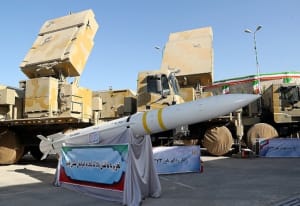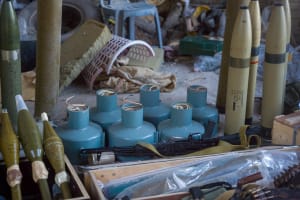3 in 4 Israelis oppose retaliatory strike on Iran if it undermines US security alliances

A solid majority of the Israeli public (74%) oppose an IDF counterstrike against Iran if it undermines Jerusalem’s security alliances with the United States and other international players, according to a fresh Hebrew University poll.
Only 26% of Israelis support a forceful strike on Iran, even if it risks damaging Jerusalem's relationships with its international and regional allies.
Some 56% of those surveyed believe Israel “should respond positively to political and military demands from its allies” to “ensure a sustainable defense system over time.” The poll specifically showed that 59% of Israelis believe Israel should coordinate its military operations with the United States due to Washington's significant assistance.
While the Biden administration supports Israel’s right to defend itself, some U.S. officials are concerned that a strong Israeli counterstrike against the Iranian regime could harm U.S. regional interests and lead to Iranian terror proxies renewing their attacks on U.S. forces in the Middle East.
Unlike most Western-oriented democracies, Israel is not a member of the formal American-led NATO defense alliance. Israel has attempted to defend itself without direct assistance from other countries and has tried to fight its wars with Israeli forces and to minimize the need for U.S. boots on the ground.
However, last weekend’s unprecedented Iranian direct missile and drone attack on Israel resulted in strong cooperation and coordination with U.S. forces, as well as those of Great Britain, France, Jordan, the United Arab Emirates and Saudi Arabia.
The U.S. military and the other members of the international alliance intercepted nearly all (99%) of the over 300 Iranian projectiles aimed at Israel late on Saturday night into Sunday morning.
While Israel expected assistance from the U.S., it pleasantly discovered the possibility of an emerging alliance with Arab regional players, including Jordan, Saudi Arabia and the UAE. Some moderate Sunni Arab states reportedly assisted Israel with intelligence and radar input.
The Hashemite Kingdom of Jordan took a particularly active role in countering the attack when its Air Force eliminated several Iranian drones that passed through its airspace. However, Jordan allegedly prefers to keep a low profile and not discuss in public its covert military cooperation with Israel.
“Jordan’s duty is to protect its lands and citizens,” Jordan’s Information Minister Samih al-Maaytah said earlier this week. "What Jordan did yesterday was to simply protect its airspace,” he added.
The Kingdom of Saudi Arabia, which has not yet formalized ties with Israel, expressed similar sentiments. A Saudi official who recently spoke to the KAN public broadcaster stressed that “every suspicious object that penetrates Saudi airspace is intercepted," calling it "a matter of sovereignty.”
He further blamed Iran for state terrorism and engineering the Israel-Hamas war in Gaza as an attempt to sabotage the emerging ties between Saudi Arabia and Israel.
“The Iranians engineered the war in Gaza in order to destroy progress in relations between us and Israel,” the Saudi official stated. “Iran’s behavior is irresponsible. We all know that Iran is a state sponsor of terrorism and it should have been stopped long ago.”
Despite recent strong international criticism concerning Israel's military operation against the Hamas terrorist organization in Gaza, its allies assisted in countering Iran's attack.
We recommend to read:

The All Israel News Staff is a team of journalists in Israel.















